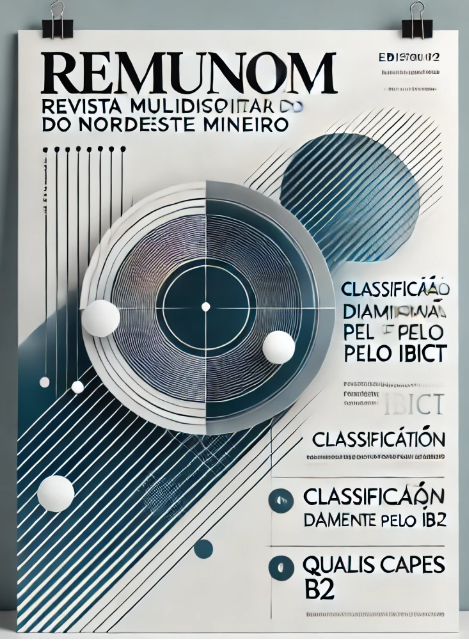A MUSICALIZAÇÃO COMO INSTRUMENTO DE ENSINO: UMA PESQUISA COM PROFESSORES DA EDUCAÇÃO INFANTIL.
DOI:
https://doi.org/10.61164/rmnm.v11i1.4158Keywords:
Música. Educação Infantil. Professor. Aluno.Abstract
Music is recognized by many researchers as a type of modality that develops the human mind, promotes balance, provides a state of well-being, and facilitates concentration and reasoning, especially in reflective matters. Through music, children understand the rhythms that have been and continue to be played in society and that there are different styles of music, which is why music is essential in the life and education of a child. Therefore, this article had the following general objective: To analyze the use of musicalization as a teaching tool, based on the reports of early childhood education teachers. The specific objectives were: To describe the history of the use of music in education; to present legal foundations for the use of music in schools; to present the use of music by early childhood education teachers. The text relies on bibliographic and quantitative research; the research sources are books, magazines, newspapers, articles, and the Internet, which provided the basis for the elaboration of the theoretical framework, and research with early childhood education teachers from the municipal education network of the city of Linhares, ES.
Keyword: Music. Early childhood education. Teacher. Student.
References
ALMEIDA, A. M. Música e educação: fundamentos e práticas. São Paulo: Editora Moderna, 2009.
ALMEIDA, Carlos José Ferreira de; PEREIRA, Walmir Fernandes. A música como facilitador da aprendizagem nos anos iniciais do Ensino Fundamental: desafios e reflexões. Revista Educação Pública, Rio de Janeiro, v. 23, n. 4, 31 jan. 2023. Disponível em: https://educacaopublica.cecierj.edu.br/artigos/23/4/a-musica-como-facilitador-da-aprendizagem-nos-anos-iniciais-do-ensino-fundamental-desafios-e-reflexoes.
BÍBLIA SAGRADA. Edição revisada e atualizada com novo acordo ortográfico. Almeida século 21. Vida Nova, 2010.
BECKER, T. The role of narrative interaction in narrative development. In: QUASTHOFF, U. M.; BECKER, T. (Org.). Narrative interaction. Amsterdam & Philadelphia: John Benjamins, 2010. p. 93-112.
BECKER JÚNIOR, Mariano Daniel. Musicalização Infantil na Rede Municipal de Ensino de Blumenau/SC: Um estudo descritivo. FURB, 2015.
BRASIL, Secretaria da Educação Fundamental. Parâmetros Curriculares Nacionais. Brasília: MEC/SEF, 1997.
________, Secretaria da Educação Fundamental. Referenciais Curriculares Nacionais para a Educação Infantil. Brasília: MEC/SEF, 1998.
_______, Ministério da Educação. Base Nacional Comum Curricular. Brasília: MEC, 2017.
BRITO, Teca de Alencar. Música na educação infantil – propostas para a formação integral da criança. São Paulo: Editora Petrópolis, 2003.
CAMARGO, Janete Santos da Silva Monteiro de. Arte e Música na Base Nacional Comum Curricular. Revista Educação Pública, v. 20, n. 37, 29 set. 2020. Disponível em: https://educacaopublica.cecierj.edu.br/artigos/20/37/arte-e-musica-na-base-nacional-comum-curricular.
CHIARELLI, Lígia Karina Meneghetti; BARRETO, S. D. A música como meio de desenvolver a inteligência e a integração do ser. Revista Recre@rte, n. 3, p. 31-50, 2005.
COELHO, Márcio; FAVARETTO, Ana Maria. Batuque batuta: música na escola. v. 1-5. São Paulo: Editora, 2010.
COSTA, Carlos Henrique; MACHADO, Simone Gorete. Piano em Grupo: livro didático para o ensino superior, volume 1. Goiânia: PUC Goiás, 2012.
FIGUEIREDO, Sergio Luiz Ferreira. Salto para o futuro – Educação Musical. 2011. Disponível em: https://www.docsity.com/pt/salto-para-o-futuro-edu-musical/4880326/. Acesso em: 15 mar. 2025.
FONSECA, V. Psicopedagogia da infância: contribuições da música no desenvolvimento cognitivo. Porto Alegre: Artmed, 2008.
GARDNER, H. Inteligências múltiplas: a teoria na prática. Porto Alegre: Artmed, 1995.
GOMES, Flávio. Samba de Raiz e Mercado: O enigma da comercialização da cultura brasileira. Revista de Sociologia e Política, v. 22, 2007.
NOGUEIRA, Cláudia de Oliveira. Música e cultura: uma abordagem antropológica. Revista Música & Sociedade, n. 30, 2010.
PENNA, Maura. Música na Escola: analisando a proposta dos PCN para o ensino fundamental. João Pessoa: Editora Universitária, 2010. Disponível em: http://www.cchla.ufpb.br/pesquisarte/Livro/6.html. Acesso em: 3 mar. 2025.
RAYNOR, Henry. História Social da Música, da Idade Média a Beethoven. Trad. Nathanael C. Caixeiro. Rio de Janeiro: Guanabara, 1986.
SOUZA, R. A.; BRITO, M. P. Educação musical nos anos iniciais: teoria e prática. Rio de Janeiro: EDUFRJ, 2011.
SOUZA JUNIOR, Francisco de Assis; FERNANDES, Licia Maria Eleutério. A importância da utilização da música na escola. Revista Educação Pública, Rio de Janeiro, v. 23, n. 6, 14 fev. 2023. Disponível em: https://educacaopublica.cecierj.edu.br/artigos/23/4/a-importancia-da-utilizacao-da-musica-na-escola.
Downloads
Published
How to Cite
Issue
Section
License
Copyright (c) 2025 Revista Multidisciplinar do Nordeste Mineiro

This work is licensed under a Creative Commons Attribution-NonCommercial-ShareAlike 4.0 International License.




